5 ETH leverages $6.5 million in voting rights, Arbitrum's election storm unveils the "Pandora's Box" of DAO governance

Reprinted from panewslab
04/10/2025·27DAuthor: Frank, PANews
As the leader in the expansion plan of Ethereum Layer2, ArbitrumDAO is highly expected not only lies in its technical strength, but also in its huge and active decentralized autonomous organization (DAO). Lead the agreement to a broader future through the collective wisdom of ARB token holders. However, a recent storm surrounding the DAO member election has pushed a "ghost" hidden in the deep waters of DeFi governance - voting bribery (voting market) to the forefront.
The core of the incident is that a platform called LobbyFi (LobbyFi) allows users to obtain voting rights worth up to $6.5 million in ARB tokens at extremely low cost (only 5ETH, approximately $10,000), and successfully influenced the results of a key committee member election. This incident was like opening Pandora's box, which not only exposed the fragility of the "one token, one vote" governance model, but also caused profound concerns about the legitimacy, security and future direction of DAO governance. Is this an isolated "black swan" event, or is it the tip of the iceberg that heralds the systemic crisis of the DAO governance model?
5 ETH leverages voting rights of $6.5 million, the capital "ghost" behind
the election storm
In early April 2025, ArbitrumDAO was conducting member elections for its newly established Oversight and Transparency Committee (OAT). This seemingly ordinary community governance activity caused a stir due to a "small" transaction.
According to DeFi researcher @DefiIgnas, an address called hitmonlee.eth spent 5 ETH (worth about $10,000 at the time) through the LobbyFi platform and purchased voting rights for as many as 19.3 million ARB tokens. The total value of these 19.3 million ARB tokens is about US$6.5 million based on the market price at that time. What is even more shocking is that the number of voting rights purchased by Wintermute and L2Beat even exceeds the number of votes that veteran well-known representatives who have been deeply engaged in ArbitrumDAO for a long time and have a large number of community commissions.
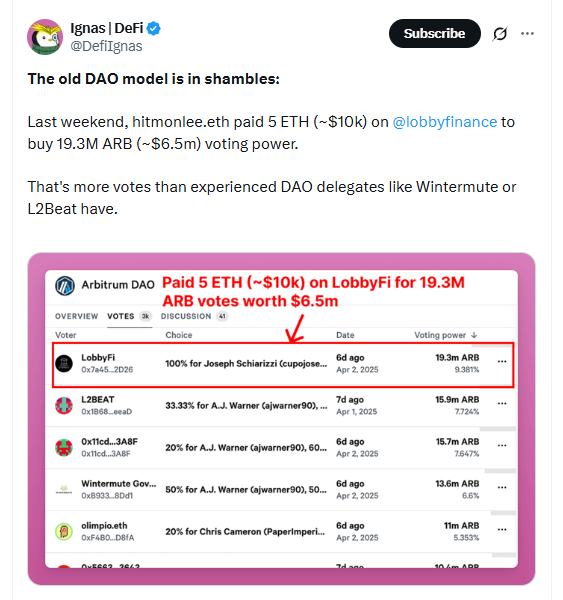
Instead of spreading these votes, hitmonlee.eth cast all of them to one of the OAT committee candidates Joseph Schiarizzi, a developer and expert in the DeFi field. This huge vote injection had a decisive impact on the election results, and ultimately helped Schiarizzi to be successfully elected as a member of the OAT committee.
The core driving force behind this incident is LobbyFinance (LobbyFi). LobbyFi is positioned as a governance influence platform, or more bluntly, a "voting rights rental market". Its operating model is to hold coins, which can entrust the token voting rights to LobbyFi to obtain a certain rental report. The sale of voting rights can be carried out through auctions, and the higher the price can be obtained; it can also be carried out through a fixed price set by the platform ("instant purchase").
In the Arbitrum OAT election case, hitmonlee.eth takes advantage of 5ETH’s “instant purchase” option. LobbyFi claims that its operation is transparent, discloses the voting rights and prices of proposals available for purchase, and gives market response time. However, the essence of this mechanism is to commodify governance power, allowing short-term capital to gain huge governance influence at a cost far less than the direct purchase of equal tokens.
The economic motivation behind the election storm
The reason why this incident caused great controversy is the imbalanced economic incentives behind it. The position of OAT committee member is not a false name, but is accompanied by actual financial returns. It is estimated that the position will receive a compensation of approximately 47.1 ETH (approximately $7,500 per month) in a 12-month term, plus a bonus of up to 100,000 ARB (approximately 18.7 ETH at the time), with a total potential gain of approximately 66 ETH.
This means that hitmonlee.eth costs just 5 ETH, which could help candidates it supports to obtain positions with potential value of up to 66 ETH. This huge profit gap undoubtedly provides a strong economic motivation for voting and purchasing behavior.
The ultimate beneficiary @CupOJoseph himself also publicly admitted that the current voting purchase is "too low-priced and very risky", believing that "geting $10,000 from DAO should not only cost $1,000." These remarks seem to have cleared the suspicion of participating in election bribery, but they also indirectly confirm the loopholes in the current system.
This is not the only low-priced deal on LobbyFi. According to @DefiIgnas, 20.1 million ARB votes were previously purchased for less than 0.07 ETH (at the time value was less than $150). Such low impact cost makes the door to DAO governance seem to be open to capital.
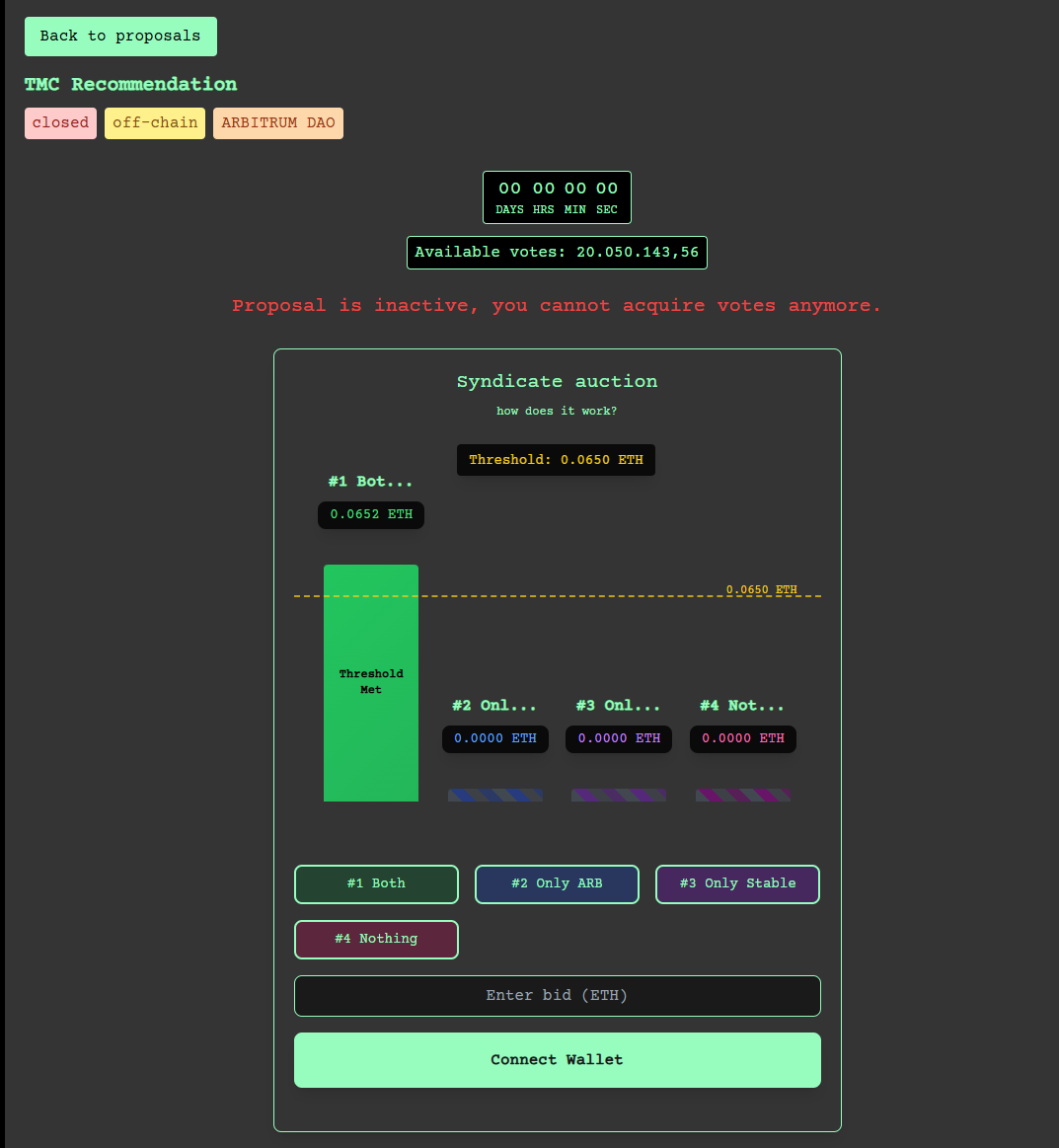
Official discussion proposals have different opinions on the community,
and DAO governance may have been under the supervision of regulatory attention
Arbitrum's voting storm caused an uproar in the community, forcing Arbitrum Foundation and DAO members to start facing the challenges brought by the voting market and actively seek solutions.
After the incident, the Arbitrum Foundation quickly launched a public discussion titled "DAO Discussion: Voting to Purchase Services" at the official governance forum. The foundation acknowledged this was a "groundbreaking moment", but did not immediately take tough measures unilaterally prohibited, but chose to throw the problem to the community, and still hoped to find the way forward through collective discussions.
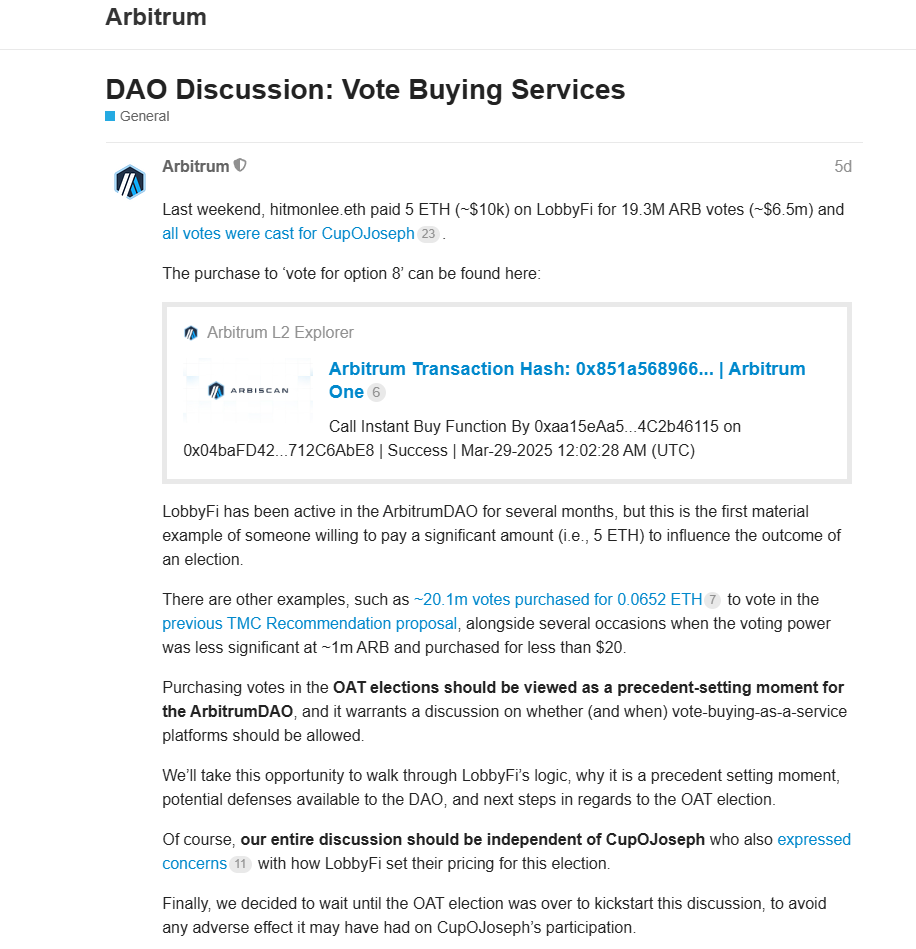
LobbyFi has been active in ArbitrumDAO for several months, according to the contents of the new proposal, but this is the first case where someone is willing to spend money to influence the election results.
The views within the community are clearly differentiated, with a few hardliners proposing zero tolerance for voting purchases, and proposing to directly cancel or ignore the ballots identified as purchases.
There are also some opinions that under the token weighted governance system, voting and purchasing is a manifestation of market power and it is difficult to completely prohibit it. Forcibly prohibiting it will only force it into a more hidden corner. They believe that platforms like LobbyFi, at least provide some traceability, may outperform private transactions that cannot be traced. Some people even believe that LobbyFi has activated the originally sleepy voting rights and increased overall participation.
More discussions focus on how to fundamentally solve the problem. The core idea is to reduce the attractiveness of voting and purchases, while increasing the rewards of "honest" governance participation.
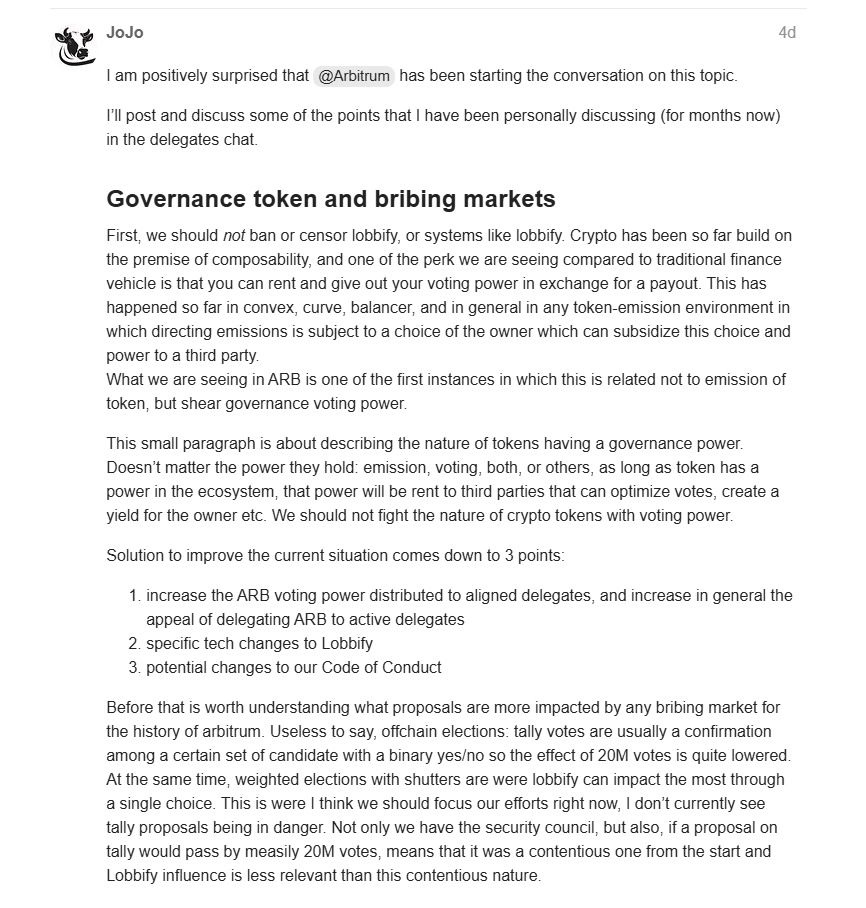
It is worth noting that the chaos and loopholes in DAO governance may also attract the attention of regulators. According to a report by Katten, institutions such as the SEC and CFTC have begun to review DeFi and DAO. In its 2017 investigation report on "TheDAO", the SEC clearly stated that tokens issued by certain DAOs may be considered securities. In the CFTC's lawsuit against OokiDAO, the court ruled that the DAO could bear legal liability as a "non-legal association", and even imply that the token holder of the voting may be jointly and severally liable. The SEC's investigation into the MangoMarkets case has also focused on the governance of the token itself for the first time. If DAO governance is generally considered susceptible to manipulation and lacks effective control, it will undoubtedly increase its risk of being incorporated into the existing financial regulatory framework and may even affect the legal characterization of governance tokens.
Pandora's box is open? DAO governance becomes a capital hunting ground
Arbitrum's voting storm is not an isolated case. It reveals the deep crisis that DAO governance in the DeFi field is generally facing. The rise of voting markets such as LobbyFi is exposing the internal contradictions of the cornerstone of DAO governance, "one token, one vote".
The core concept of DAO is decentralization and community autonomy. Ideally, decisions should be based on community members’ understanding of the agreement and long-term interests. However, the emergence of the voting market has enabled governance influence to be purchased directly with money, and the balance of decision-making has begun to tilt towards capital.
A more extreme case is the "coup" of BuildFinanceDAO: On February 9, 2022, a user gained control of the DAO by purchasing enough BUILD tokens in the open market, and then gave himself the power to mint new coins and control the vault through a proposal, which eventually swept away about $470,000 in assets and zeroed in the value of the original token.
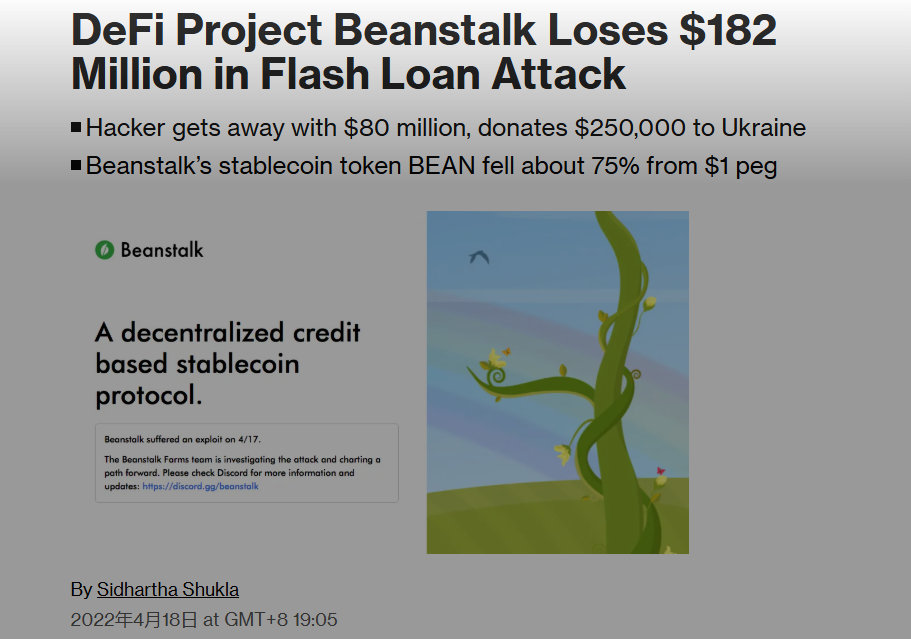
In 2022, BeanstalkFarms was attacked by a flash loan. The attackers borrowed a large number of governance tokens in a single block and plundered $182 million in reserves through emergency proposals. These cases highlight the vulnerability of the DAO governance mechanism, and the voting market undoubtedly provides a more convenient and economical "weapon" for potential attackers.
The voting storm of ArbitrumDAO, like a prism, reflects the dilemma of the current DAO governance model's difficult balance between efficiency, fairness and security. Behind the simplicity of "one token, one vote" is the potential erosion of capital to the decentralized ideal. The emergence of voting markets such as LobbyFi is the product of the market's spontaneous pursuit of efficiency and benefits, but it has indeed opened the door to convenience for governance manipulation and brought severe challenges.
At present, there is no one-time solution. A complete ban on the voting market may be difficult to enforce and may push the problem to a more hidden corner. A complete laissez-free market may lead to DAO becoming a game of capital. This storm sounded a wake-up call for all DAO participants: decentralized governance is not a utopia that can be achieved overnight, it is a complex system that requires continuous design, iteration and gameplay. How to build a governance moat that is robust enough to resist capital erosion and malicious attacks while maintaining an open and licenseless Web3 spirit, will be the core proposition that the entire DeFi field must face and answer in the future.

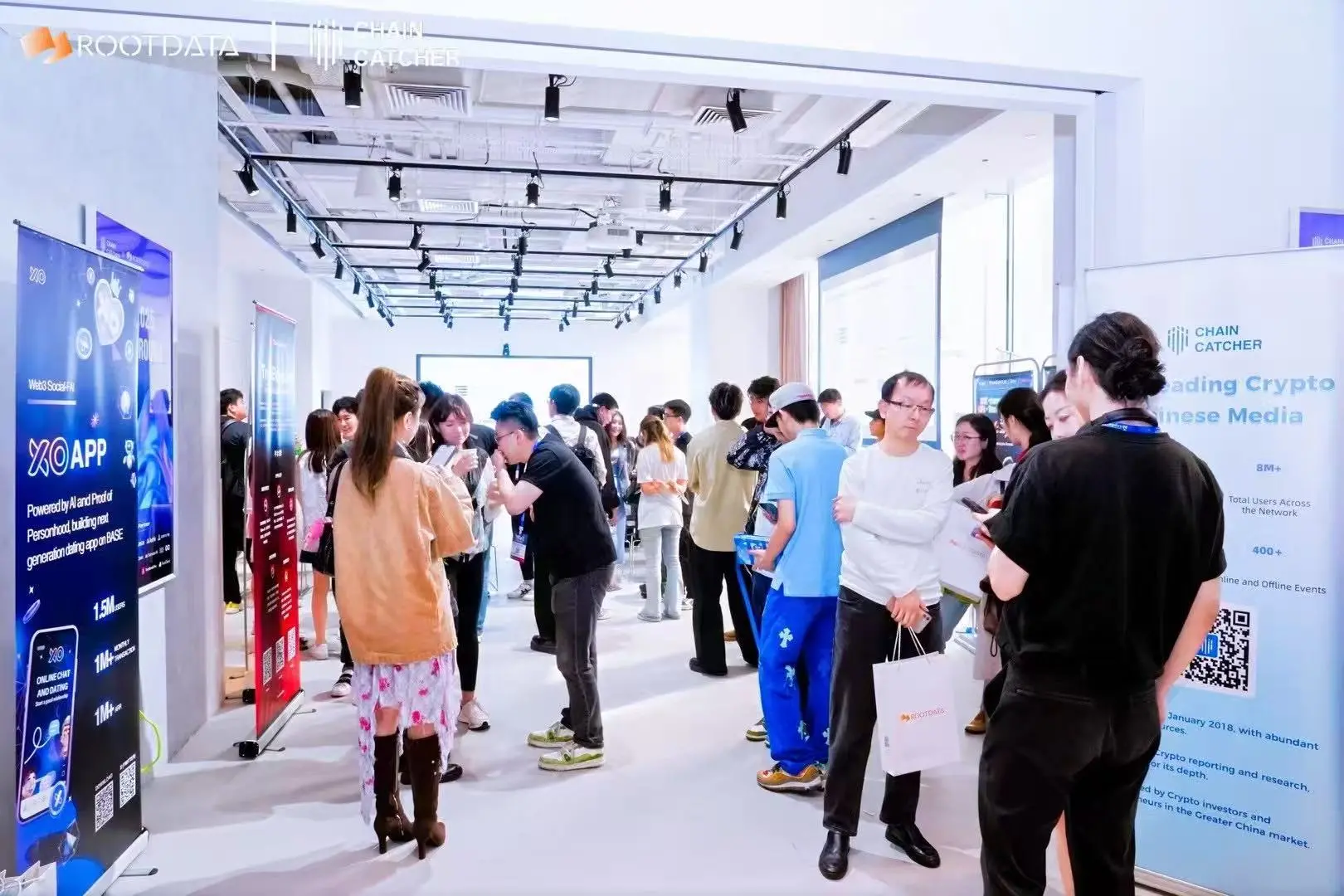
 chaincatcher
chaincatcher

